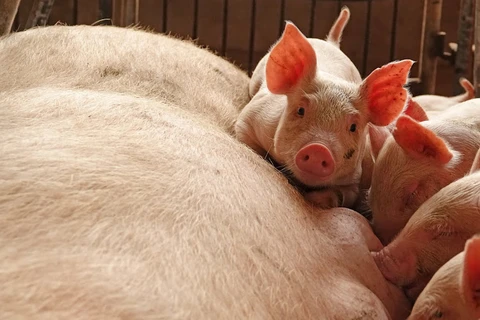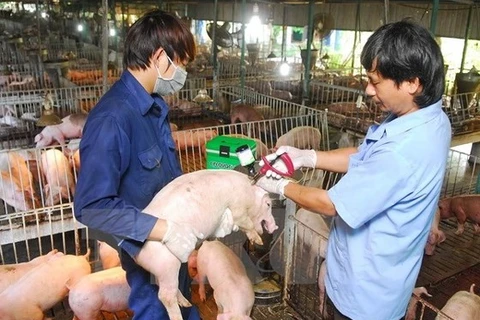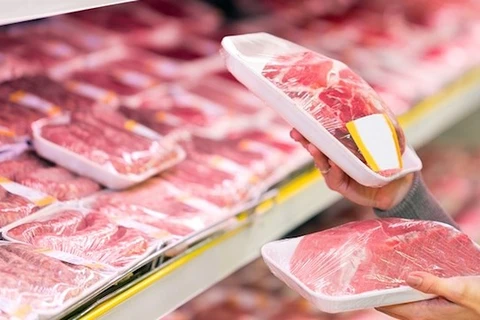Hanoi (VNA) – Ministries, sectors, provinces and cities nationwide must take drastic measures to prevent animal diseases, particularly African Swine Fever (ASF), from entering Vietnam, said Deputy Prime Minister Trinh Dinh Dung.
He was speaking at an online conference held in Hanoi on September 14 by the Ministry of Agriculture and Rural Development to seek ways to prevent animal diseases for this year’s fall and winter.
Requesting that cities and provinces nationwide strengthen inspection to detect hotbeds of diseases on poultry and livestock early on and prevent them from spreading, Dung underscored the importance of proper vaccinations for animals and the provision of prevention guidelines at local levels.
As there is no vaccine or cure for ASF, the most effective measure at present is to actively prevent it from entering the country, said Deputy Minister of Agriculture and Rural Development Ha Cong Tuan.
To do this, relevant ministries and agencies need to tighten control on the transportation of pork and its products, as well as promote safe pig farming, he added.
ASF is a type of infectious hemorrhagic fever which results in a 90-100 percent mortality rate for pigs. Although the disease is not dangerous to humans, it can cause great economic losses for farmers and harm pork trading.
It is spread from pig to pig through various ways, including animal feed contaminated with the pathogen, carriers such as ticks, or direct contact between infected pigs and healthy ones.
From the end of 2017 through to September 10, 17 countries and regions in Europe and Asia such as China and Estonia have had ASF outbreaks, with over 560,000 pigs culled, according to the World Organisation for Animal Health (OIE).
From the start of August to September 10, China reported 14 outbreaks in six provinces, with 38,000 pigs culled, according to the OIE and the UN Food and Agriculture Organisation (FAO). The disease is moving southward towards provinces near Vietnam.
There is a risk of ASF virus being brought into Vietnam through smuggling and the transportation of pork and pork products with unclear origin which is quite popular in northern border provinces.
It is vital to protect pig farms from the virus by fostering biosafety and intensify pasteurisation in farms, said Ken Inui from the FAO.
Inui suggested the Ministry of Agriculture and Rural Development promptly draw up an emergency response plan and raise public awareness of the disease. He also urged for an immediate ban on the illegal trading of pigs from China to Vietnam.–VNA
He was speaking at an online conference held in Hanoi on September 14 by the Ministry of Agriculture and Rural Development to seek ways to prevent animal diseases for this year’s fall and winter.
Requesting that cities and provinces nationwide strengthen inspection to detect hotbeds of diseases on poultry and livestock early on and prevent them from spreading, Dung underscored the importance of proper vaccinations for animals and the provision of prevention guidelines at local levels.
As there is no vaccine or cure for ASF, the most effective measure at present is to actively prevent it from entering the country, said Deputy Minister of Agriculture and Rural Development Ha Cong Tuan.
To do this, relevant ministries and agencies need to tighten control on the transportation of pork and its products, as well as promote safe pig farming, he added.
ASF is a type of infectious hemorrhagic fever which results in a 90-100 percent mortality rate for pigs. Although the disease is not dangerous to humans, it can cause great economic losses for farmers and harm pork trading.
It is spread from pig to pig through various ways, including animal feed contaminated with the pathogen, carriers such as ticks, or direct contact between infected pigs and healthy ones.
From the end of 2017 through to September 10, 17 countries and regions in Europe and Asia such as China and Estonia have had ASF outbreaks, with over 560,000 pigs culled, according to the World Organisation for Animal Health (OIE).
From the start of August to September 10, China reported 14 outbreaks in six provinces, with 38,000 pigs culled, according to the OIE and the UN Food and Agriculture Organisation (FAO). The disease is moving southward towards provinces near Vietnam.
There is a risk of ASF virus being brought into Vietnam through smuggling and the transportation of pork and pork products with unclear origin which is quite popular in northern border provinces.
It is vital to protect pig farms from the virus by fostering biosafety and intensify pasteurisation in farms, said Ken Inui from the FAO.
Inui suggested the Ministry of Agriculture and Rural Development promptly draw up an emergency response plan and raise public awareness of the disease. He also urged for an immediate ban on the illegal trading of pigs from China to Vietnam.–VNA
VNA
























